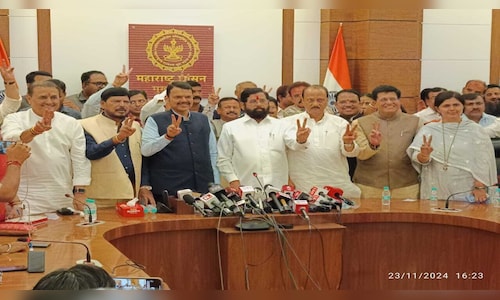Significant Shifts in Maharashtra and Jharkhand Elections: The Empowerment of Women Voters
The recent state elections in Maharashtra and Jharkhand have brought forth unexpected changes in the political arena. In Maharashtra, the BJP-led Mahayuti alliance achieved a remarkable victory, while the JMM-Congress-RJD coalition has set the stage for success in Jharkhand. These outcomes highlight the growing significance of welfare policies, regional leadership, and the crucial impact of women voters on electoral results.
Maharashtra: The Mahayuti Alliance’s Impressive Performance
The BJP-led Mahayuti alliance made a significant mark in the Maharashtra assembly elections, securing victories across the 288-seat assembly—an outcome that surpassed initial forecasts. BJP spokesperson Gopal Krishna Agarwal attributed this success to a mix of leadership, particularly that of Prime Minister Narendra Modi, and the dedicated efforts of the RSS. Agarwal noted the RSS’s role in consolidating Hindutva votes and reaching out to Dalit communities as critical factors in their win. Furthermore, he highlighted the party’s effective communication strategies that countered opposition misinformation regarding BJP policies and the Constitution.
Congress’s Response: A Shift in Strategy?
In response to the BJP’s success, Congress spokesperson Saral Patel acknowledged the achievement but suggested that the reliance on RSS assistance indicates a departure from PM Modi’s previously dominant personal appeal that fueled the BJP’s victories in 2014 and 2019. Patel raised concerns regarding the potential exploitation of government agencies, such as the IT department and ED, in Maharashtra, suggesting that this may have influenced the electoral results.
Jharkhand: The Rise of the JMM-Congress-RJD Alliance
In Jharkhand, the JMM-Congress-RJD alliance, spearheaded by the Jharkhand Mukti Morcha, emerged as the victor. Political analysts, including Business Standard’s AK Bhattacharya, have pointed out the growing importance of regional leadership and the increasing emphasis on welfare-focused campaigns as essential elements for successful elections. Bhattacharya underscored the significance of programs like the Mahila Samman Program, which specifically addresses women’s welfare and has had a substantial impact on the JMM’s electoral success.
Women’s Empowerment at the Core of Electoral Strategy
Political analyst Sajjan Kumar echoed these views, noting that initiatives such as the Ladki Bahin Yojana in Maharashtra significantly influenced women voters. He observed that this welfare program, combined with other financial aid initiatives, has contributed to shifting household dynamics, empowering women as a vital voting bloc. This transformation illustrates a broader trend in India’s electoral politics, where women-focused welfare initiatives are becoming critical to winning over voters. The BJP’s promotion of women-friendly measures has clearly resonated, especially among households where women benefit directly from these programs.
Regional Dynamics and the Future of Electoral Politics
The emergence of regional leaders and a focus on welfare have fundamentally reshaped the dynamics of Indian electoral politics. While national leadership continues to hold importance, regional figures and localized issues are gaining prominence. In Maharashtra, new-generation leaders like Eknath Shinde are connecting with younger voters, presenting a contrast to the older generation’s allegiance to seasoned politicians like Sharad Pawar and Balasaheb Thackeray.
Conclusion: The Growing Importance of Women and Welfare in Politics
The 2024 elections in Maharashtra and Jharkhand signify a pivotal change in India’s political narrative, emphasizing the roles of regional leaders, welfare initiatives, and the empowerment of women voters. The lessons drawn from these elections are unmistakable: welfare schemes, especially those targeting women, are integral to achieving electoral success, and regional issues are increasingly outweighing national leadership in influencing political decisions.


